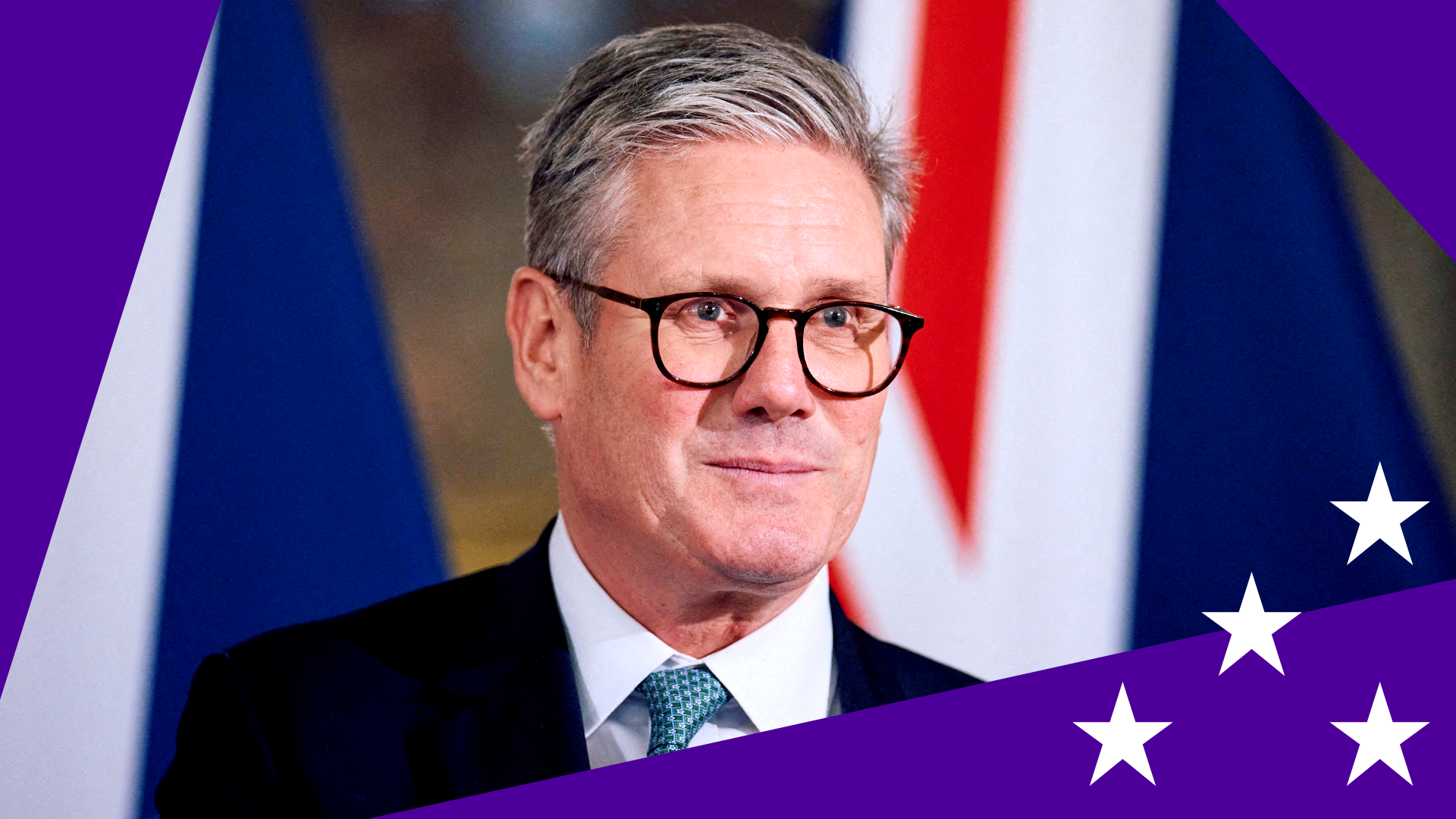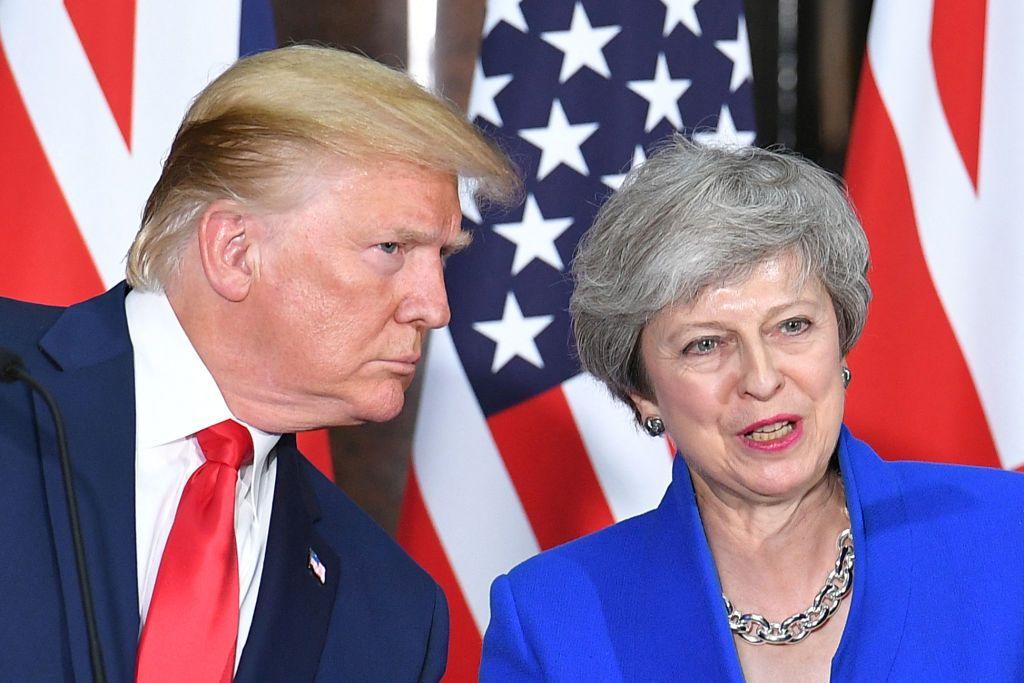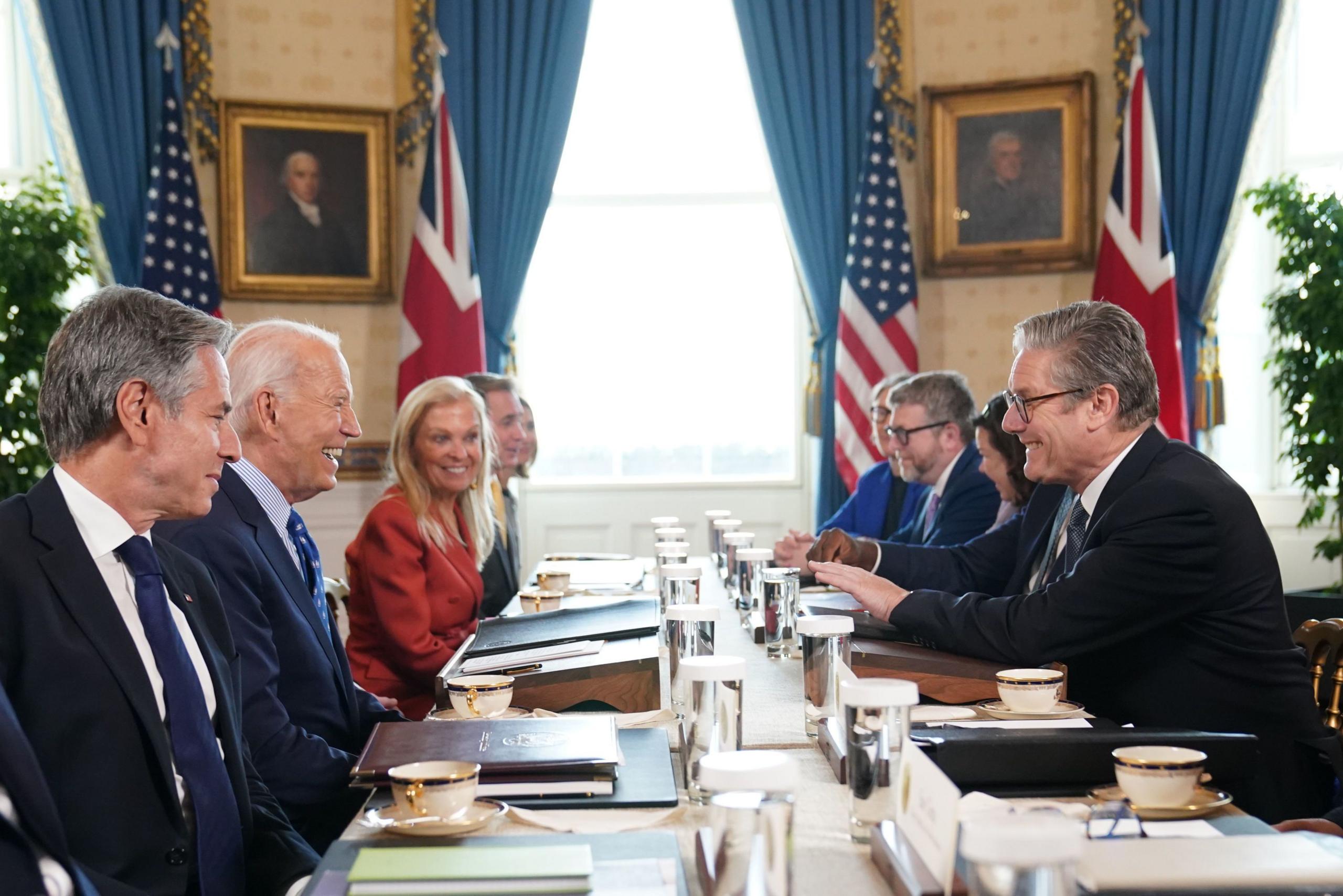Harris or Trump: How UK is preparing for new US president

- Published
“To everyone’s astonishment, the vulgar insurgent has won!”
So wrote a British foreign minister in his diaries on 9 November 2016 after Donald Trump beat Hillary Clinton to the White House.
“This looked remarkably like an abuse of power.”
So wrote the then-prime minister in her memoirs after waking up to realise that a Trump-led Washington had said US troops would be pulled out of the fight against the Islamic State group in Iraq and Syria “without any reference to the UK and other nations whose troops were operating alongside them”.
Sir Alan Duncan and Theresa May are the authors of these remarks, which the present prime minister, Sir Keir Starmer, would do well to note as he ponders what difference a Trump or Kamala Harris presidency could make to the so-called special relationship between the UK and the US.
“Dealing with Donald Trump and his administration was like dealing with no other world leader," writes the now Lady May in a book reflecting on her career.
"He was an American president like no other."

There will be challenges, too, if the Democratic vice-president wins. She has yet to meet Sir Keir and has shown limited affinity for Europe - but she will be a vastly more conventional president than her rival.
On the off-chance that Sir Keir thought things might be different this time if Trump wins next week, the last few days showed him otherwise.
The accusation of election interference made by the Trump campaign - courtesy of an, at best, foolishly written LinkedIn post - blew up into a transatlantic spat.
“This needs to be seen for what it is. It’s happened every election, every political party does it,” Sir Keir told me, in reference to people volunteering to work for one side or the other in American elections.
But the difference was obvious. On previous occasions it hasn’t caused an almighty row.
It was a reminder that Team Trump can be brash, unpredictable and have a long memory for perceived slights - and don’t appear to really give a stuff about its relationship with the British government.
What on earth might happen to the UK’s most cherished overseas partnership if Trump wins?
Until the row in the past week, things had, on the face of it, been going well for the new prime minister and US relations.
Henry Zeffman: How a LinkedIn post sparked a transatlantic row
- Published23 October 2024
Starmer meets Trump for the first time
- Published27 September 2024
Starmer unlikely to meet Harris before US election
- Published24 October 2024
A few weeks ago, Sir Keir and Foreign Secretary David Lammy were in New York to meet the former president, with me accompanying them.
Teetering on a pavement on Fifth Avenue with the 58-storey Trump Tower behind me, we were trying to perfect the angle for broadcast so the garish gold lettering spelling out “TRUMP TOWER” was visible to viewers, even if a giant lorry barrelled down the road as I started talking.
I think we managed it. But a similar balancing act faced the two men. They were in New York for the United Nations General Assembly - but much of the chat on the trip was not about them meeting one of the world leaders present, but whether they could get time with a candidate hoping to become one: Donald Trump.
And they did get that meeting - which tells you rather a lot about the work British diplomats in America and London have been putting in, and the determination of Sir Keir and Mr Lammy to build bridges with the man who may be president again before long.
The prime minister later told me on BBC’s Newscast that “we both wanted to ensure we have a good relationship”. He added: “It's up to me as prime minister to make sure I have a good relationship with whoever the president is."
“I believe strongly in personal relations. Have the ability to, as necessary, pick up the phone to them to sort out issues or talk about issues. So it was a good dinner and I'm really glad that we managed to do it.”
Glad, no doubt, in part because of the buckets full of disobliging quotes there are about Trump, not least from David Lammy, who once described his host as a “woman-hating, neo-Nazi-sympathising sociopath” and a “tyrant in a toupee”.
There are no shortage of verbal skeletons in Labour’s cupboard about the man who could soon be back in the Oval Office.

In policy terms, a Trump presidency would likely bring rapid change - on climate change, on international trade (whacking up import taxes, tariffs) and on Ukraine.
Unlike a Harris administration, they would likely offer the UK a free trade deal, but it seems unlikely the terms of it would tempt London to sign up.
So what of Trump’s Democratic rival, the vice-president Kamala Harris?
Diplomatic niceties suggest if you meet one candidate in a foreign election contest, you meet the other one too.
But that isn’t likely to happen with Harris, despite Sir Keir visiting America three times since July.
No 10 blames the pressures on the vice-president’s diary in an election campaign.

It is worth stating the obvious too – while Sir Keir and Harris have never met, she is a vastly more known quantity and far more likely to be conventional in her approach to high office than her rival.
And Sir Keir has gone out of his way to spend a lot of time with President Biden in the last four months, including two trips to the White House and a recent meeting in Berlin.
An imperfect way of getting a sense of how his vice-president might govern – and with no opportunity to build a personal relationship – but not entirely useless at getting something of a handle on it.
Oh and it is worth making a very big picture point too – whoever wins. Increasingly, America’s focus is on the rise of the east and in particular China. Europe matters less to Washington than it did and that holds true whatever the result.
And so Westminster and the world awaits.
Whatever happens, expect the conversation to quickly turn to if and when the prime minister gets an early invite to Washington in the new year.
There will be a queue of leaders heading to the White House.
And what about a state visit to the UK – as Donald Trump revelled in, in 2019 - for a returning president like no other or for America’s first woman president?
Let’s see.

Between now and the US election on 5 November, BBC correspondents around the world are exploring the impact its outcome could have where they are, and what people around the globe make of this White House race.